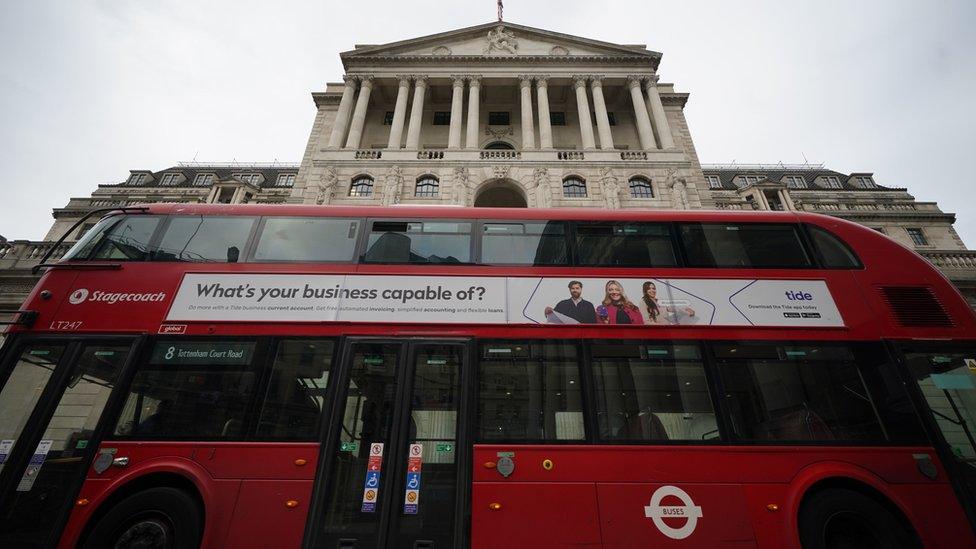Minister Kit Malthouse 'surprised' at market reaction to tax cuts
- Published
“I find myself a bit surprised that people are surprised," says Kit Malthouse
A cabinet minister has said he was surprised at the market reaction to tax cuts announced in last week's mini-budget.
The cuts, funded by increasing government debt, sparked a fall in the value of the pound and a surge in borrowing costs earlier this week.
Education Secretary Kit Malthouse said Liz Truss had "advertised" a change in approach in her Tory leadership bid.
He added he hoped "things will settle" after a "challenging week".
He told the BBC's Political Thinking with Nick Robinson podcast the tax cuts should be seen as part of a wider plan to boost growth.
The government's package of tax cuts sparked days of turbulence in financial markets after it was set out on 23 September.
The pound fell to a record low against the US dollar on Monday, although it has since recovered to closer to its level before the announcements.
In an interview recorded on Thursday, Mr Malthouse said the prime minister had "advertised" during her Tory leadership campaign that "change was coming".
He added that the mini-budget had responded to calls "across the spectrum" to boost growth by improving productivity and changing the nature of the economy.
"Her stepping into that, particularly with an energy crisis, seems to have taken a lot of people by surprise and I'm a bit perplexed by that," he added.

The Bank of England has started buying government debt to calm the market turmoil
"As far as I can see, she's moved extremely swiftly to fulfil some of the pledges she made during the leadership election campaign".
"Maybe it wasn't picked up enough. Certainly she said she said was going to move within seven days, and that's what she did".
"While obviously the market reaction is something we have to pay attention to and understand and address [...] I remain surprised that people are surprised."
Pressed on whether the government should have made its strategy more obvious, Mr Malthouse said he thought it was "a given" that a Conservative Party would be careful with public finances.
"Maybe that is one of the reasons why we are surprised that people are surprised.
"It is a given that our job is to make the books balance - I'm sure that's what the Treasury will lay out in the weeks to come."
'Balance the books'
The £45bn in tax cuts announced last week included some pledges announced by Ms Truss during her leadership bid, including scrapping green levies on energy bills and reversing April's rise in National Insurance.
She had also announced her intention to cancel a scheduled rise in corporation tax from next April.
However, she did not campaign on other measures included in the statement, including cuts to stamp duty on new properties bought in England and Northern Ireland.
Although she had indicated a desire to lower personal taxes, she did not specifically mention announcements income tax, including a 1% cut in basic rate and scrapping the top 45p rate from next April.
Chancellor Kwasi Kwarteng is facing pressure to bring forward a blueprint to lower government debt levels he has scheduled for 23 November.
Before then, Ms Truss and Mr Kwarteng will outline a series of proposals aiming to boost growth, including on housing, childcare and immigration. As more details are released, "people can see what the plan is" Mr Malthouse said.
"It is a given that our job is to make the books balance - I'm sure that's what the Treasury team will lay out in the weeks to come."
Grammar schools
Ms Truss has previously suggested she will lift the ban on opening new grammar schools in England.
It is currently unlawful to open new grammars in England - state schools which select at the age of 11 on the basis of ability - but existing ones can expand, and around 176,000 pupils attend one.
But Mr Malthouse suggested no changes to the current system were imminent.
Grammar schools would be only one part of "a whole network of brilliant schools across the country", Mr Malthouse said.
"We have to have a conversation about what people actually want when they say 'I want a grammar school' - is that about a school, is that about a political ethos or a certain type of education?"
Nick Robinson's interview with Kit Malthouse will be broadcast on BBC Radio 4 at 17:30 BST on Saturday, and will also be available on BBC Sounds and the Political Thinking website.
Related topics
- Published23 September 2022

- Published17 October 2022
